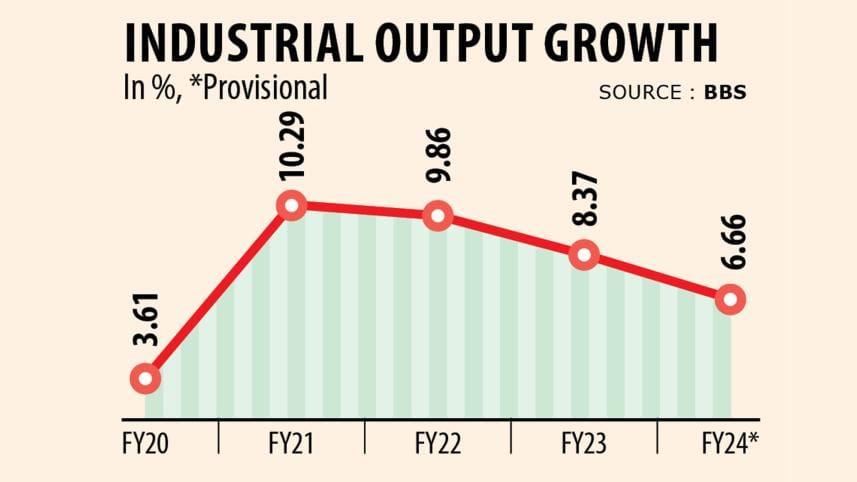Industrial output growth slows to four-year low

Industrial output in Bangladesh grew at its slowest pace since the Covid-19 pandemic, hitting 6.66 percent last fiscal year owing to declining exports, import restrictions and a slowdown in domestic demand due to persistent inflation.
According to entrepreneurs and analysts, soaring gas and power prices, alongside shortages in the supply of gas to production units, exacerbated the situation.
Factory output grew 8.37 percent in FY23, according to data published by the Bangladesh Bureau of Statistics (BBS).
The data was revealed two months into the current fiscal year, which has been marred by a significant slump in industrial production amid mass protests since July.
The protests, which led the government to issue nationwide curfews, disrupted the transportation of goods and culminated in Sheikh Hasina's resignation from her post as prime minister on August 5. However, industrial establishments have been victims of arson and vandalism since, causing further production shocks.
An interim government has already been sworn in, but business activities are yet to return to normal.
After recording 3.61 percent growth in FY20, the lowest since FY97 when it stood at 6.39 percent, industrial output expectedly increased in FY21.
However, it has been slowing each year since.
The industrial sector accounts for roughly 38 percent of the country's economy, which grew by 5.82 percent in FY24, the second consecutive year it fell short of 6 percent, according to BBS data.
"This slow growth was not completely unexpected as the last fiscal year was entangled in economic pressures and mismanagement," said M Masrur Reaz, chairman of Policy Exchange of Bangladesh.
Import restrictions affected the arrival of raw materials and intermediate goods, which contributed to sluggish industrial growth, he added.
"As a result, the production capacity of factories reduced."
At the same time, domestic demand slowed due to high inflation and rising interest rates, Reaz added.
Annual inflation rose to 9.73 percent in FY24, the highest since FY12, according to the BBS.
"A contractionary monetary policy was needed to address inflation. But it was unwise to fight inflation by only using the monetary policy," he said.
Pointing to the causes of persistent inflation, he said: "The interest rate has been high for a long time. There is no focus on the supply chain. There is no focus on market manipulation. That is why it has happened."
Mohammad Hatem, president of the Bangladesh Knitwear Manufacturers and Exporters Association (BKMEA), blamed policy constraints and the lack of a service-first mentality among bankers and public servants, including those at the National Board of Revenue (NBR), for the sluggish growth in industrial production.
"Entrepreneurs are currently in trouble as banks are not cooperating with us to import raw materials," he said.
Providing an example, he said: "Around 18 days ago, I applied for a letter of credit for over $700,000 but banks are yet to complete the process."
Besides, policy inconsistencies are hindering entrepreneurs from making new investments or going for factory expansion, he added.
Criticising the NBR's role and hoping the new NBR chairman would take proper action, Hatem said: "Some officials often harass businessmen. They don't catch the big fish. Instead, they harass compliant taxpayers."
Reaz added that private sector credit growth had slowed due to the contractionary monetary policy, adding: "Addressing the long-term fundamental constraints in our policy environment and our economic strategies would help spur a faster rate of industrialisation."
Reaz opined the interim government should focus on ensuring medium- and long-term solutions.
"First and foremost, we need an economic growth strategy which clearly identifies the role or importance of industrialisation and how Bangladesh will go about spurring or stimulating it.
"That would involve necessary reforms in infrastructure, business regulatory environment, skills and technology adoption, and logistics services and logistics infrastructure," he said.
He further said efficiency must be ensured.
"Even if there is infrastructure, there must be efficiency. The biggest example of this is our electricity sector."




 For all latest news, follow The Daily Star's Google News channel.
For all latest news, follow The Daily Star's Google News channel.
Comments